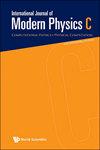反应扩散TAP
IF 1.6
4区 物理与天体物理
Q3 COMPUTER SCIENCE, INTERDISCIPLINARY APPLICATIONS
引用次数: 0
摘要
最近推出的“相邻可能理论”(TAP)是一种组合创新模型,旨在解释人类技术进化的“曲棍球棒”式上升趋势,即随着复杂性的增加,生产的产品数量突然出现爆炸式增长。此外,TAP模型也被用于解释快速出现的生物复杂性。受TAP的启发,我们提出了一个反应-扩散系统,旨在在空间和时间上扩展模型。我们发现,新模型表现出与TAP模型相似的特征,比如在较长一段时间的缓慢增长之后,项目的产量突然增加。新模型还表现出“创新”的波传播,导致自我维持的复杂干涉图案。本文章由计算机程序翻译,如有差异,请以英文原文为准。
Reaction Diffusion TAP
The recently introduced Theory of the Adjacent Possible (TAP) is a model of combinatorial innovation aiming to explain the “hockey-stick” upward trend of human technological evolution, where an explosion in the number of produced items with increasing complexity suddenly occurs. In addition, the TAP model was also used to explain the rapidly emerging biological complexity. Inspired by TAP here we propose a reaction–diffusion system aiming to extend the model in both space and time. We show that the new model exhibits similar characteristics to the TAP model, like the sudden increase in the production of items, after a longer period of slow growth. The new model also exhibits wave propagation of “innovation”, resulting in self-sustained complex interference patterns.
求助全文
通过发布文献求助,成功后即可免费获取论文全文。
去求助
来源期刊

International Journal of Modern Physics C
物理-计算机:跨学科应用
CiteScore
3.00
自引率
15.80%
发文量
158
审稿时长
4 months
期刊介绍:
International Journal of Modern Physics C (IJMPC) is a journal dedicated to Computational Physics and aims at publishing both review and research articles on the use of computers to advance knowledge in physical sciences and the use of physical analogies in computation. Topics covered include: algorithms; computational biophysics; computational fluid dynamics; statistical physics; complex systems; computer and information science; condensed matter physics, materials science; socio- and econophysics; data analysis and computation in experimental physics; environmental physics; traffic modelling; physical computation including neural nets, cellular automata and genetic algorithms.
 求助内容:
求助内容: 应助结果提醒方式:
应助结果提醒方式:


